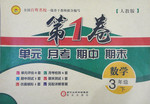题目内容
The old man still remembers that it was his grandmother who b______________ him up in the faraway village.
练习册系列答案
 第1卷单元月考期中期末系列答案
第1卷单元月考期中期末系列答案
相关题目
题目内容
The old man still remembers that it was his grandmother who b______________ him up in the faraway village.
 第1卷单元月考期中期末系列答案
第1卷单元月考期中期末系列答案